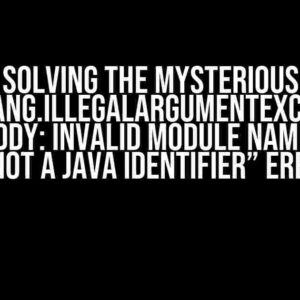In the world of object-oriented programming, classes play a vital role in defining the structure and behavior of objects. One common question that arises among developers is whether it’s possible to check if a given class has at least one public method. In this article, we’ll delve into the world of reflection and explore the possibilities of achieving this feat.
Why Do We Need to Check for Public Methods?
Before we dive into the solution, let’s understand the importance of checking for public methods. Here are a few scenarios where this knowledge comes in handy:
- API Design: When designing an API, it’s crucial to ensure that the classes exposed to the outside world have at least one public method. This allows external applications to interact with your API effectively.
- Automated Testing: In automated testing, you might want to verify that a specific class has at least one public method to ensure that it’s not a “dead” class, i.e., a class that doesn’t provide any functionality.
- Code Analysis: Code analysis tools often need to check for public methods to identify potential issues or areas of improvement in the codebase.
Reflection to the Rescue!
Reflection is a powerful mechanism in programming languages that allows us to inspect and modify the behavior of classes, methods, and other elements at runtime. In Java, we can use the java.lang.reflect package to achieve our goal.
Getting the Methods of a Class
To check if a class has at least one public method, we need to retrieve a list of all its methods. We can use the getMethods() method of the java.lang.Class class to achieve this.
<code>
import java.lang.reflect.Method;
public class MethodChecker {
public static void main(String[] args) {
Class<?> clazz = MyClass.class; // Replace with the class you want to check
Method[] methods = clazz.getMethods();
for (Method method : methods) {
// We'll get to this part later
}
}
}
</code>
Filtering Public Methods
The getMethods() method returns an array of all public methods, including those inherited from superclasses. To filter out only the public methods declared in the class itself, we can use the getDeclaredMethods() method instead.
<code>
Method[] methods = clazz.getDeclaredMethods();
for (Method method : methods) {
if (Modifier.isPublic(method.getModifiers())) {
// We've found a public method!
System.out.println("Public method found: " + method.getName());
}
}
</code>
A More Elegant Solution
Instead of manually iterating over the methods, we can use Java 8’s Stream API to simplify the process.
<code>
import java.lang.reflect.Method;
import java.util.stream.Stream;
public class MethodChecker {
public static void main(String[] args) {
Class<?> clazz = MyClass.class; // Replace with the class you want to check
boolean hasPublicMethod = Stream.of(clazz.getDeclaredMethods())
.anyMatch(method -> Modifier.isPublic(method.getModifiers()));
if (hasPublicMethod) {
System.out.println("The class has at least one public method.");
} else {
System.out.println("The class does not have any public methods.");
}
}
}
</code>
Common Pitfalls and Edge Cases
When working with reflection, it’s essential to be aware of some common pitfalls and edge cases:
- Private and Protected Methods: Remember that
getDeclaredMethods()returns both public and non-public methods. If you only want to check for public methods, make sure to filter them out accordingly. - Inherited Methods: As mentioned earlier,
getMethods()returns all public methods, including those inherited from superclasses. If you want to check only the methods declared in the class itself, usegetDeclaredMethods(). - Interfaces and Abstract Classes: Keep in mind that interfaces and abstract classes can have public methods, but they might not have an implementation. Make sure to handle these cases appropriately.
Conclusion
In conclusion, checking if a given class has at least one public method is indeed possible using Java’s reflection API. By leveraging the getDeclaredMethods() method and filtering out non-public methods, we can achieve our goal with ease. Remember to be aware of common pitfalls and edge cases to ensure accurate results.
| Method | Description |
|---|---|
getMethods() |
Returns an array of all public methods, including those inherited from superclasses. |
getDeclaredMethods() |
Returns an array of all methods declared in the class itself, including private and protected methods. |
Modifier.isPublic() |
Checks if a method is public. |
By following the instructions outlined in this article, you should be able to write a robust method checker that accurately detects public methods in a given class. Happy coding!
Frequently Asked Question
Get ready to deep dive into the world of coding and find out if it’s possible to check if a given class has at least one public method!
Q1: Is there a way to check if a class has at least one public method using Java Reflection?
Yes, you can use Java Reflection to check if a class has at least one public method. You can use the `getMethods()` method of the `Class` class to get an array of `Method` objects, and then iterate through the array to check if any of the methods are public.
Q2: Can I use Java 8’s Stream API to check if a class has at least one public method?
Yes, you can use Java 8’s Stream API to check if a class has at least one public method. You can use the `stream()` method to create a stream from the `Method` array, and then use the `anyMatch()` method to check if any of the methods are public.
Q3: Is there a way to check if a class has at least one public method that takes a specific parameter?
Yes, you can use Java Reflection to check if a class has at least one public method that takes a specific parameter. You can use the `getMethods()` method to get an array of `Method` objects, and then iterate through the array to check if any of the methods take the desired parameter.
Q4: Can I use annotations to mark methods as public and then check for their presence?
Yes, you can use annotations to mark methods as public and then check for their presence. You can create a custom annotation, and then use Java Reflection to check if any methods in the class are annotated with it.
Q5: Is it possible to check if a class has at least one public method using AspectJ or other AOP frameworks?
Yes, it is possible to check if a class has at least one public method using AspectJ or other AOP frameworks. You can use pointcuts and advice to inspect the class and its methods, and then check if any of the methods are public.





![How to Check if a Field is Annotated by a Lombok Annotation at Runtime? [duplicate] How to Check if a Field is Annotated by a Lombok Annotation at Runtime? [duplicate]](https://triphena.hkhazo.biz.id/wp-content/uploads/sites/49/2024/07/how-to-check-if-a-field-is-annotated-by-a-lombok-annotation-at-runtime-duplicate-with-text-300x300.jpg)